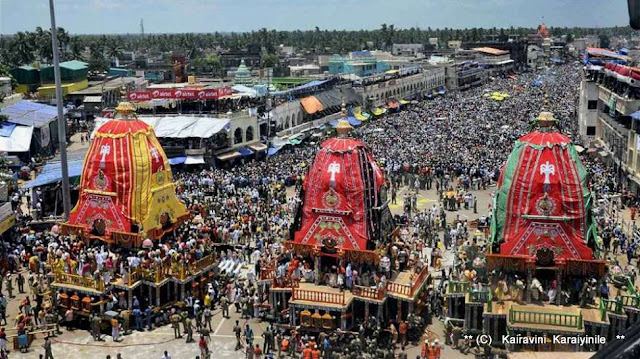Swami
Nammalwar prays to that God on bird Garuda – clouds of dust being raised, the bad Asuras being chased out .. through living countless cycles of birth and
death, having found the Lotus feet of Sriman Narayana, Azhwar prays Lord not to part with him
anymore, as submission to Him consoles heart and imbues endless joy.
மாறிமாறிப் பலபிறப்பும் பிறந்து அடியை அடைந்து உள்ளம் தேறி*
ஈறிலின்பத்து திருவெள்ளம்
யான்மூழ்கினன்,
பாறிப்பாறி அசுரர்தம் பல்குழாங்கள்
நீறெழ, பாய்பறவை ஒன்று ஏறி*
வீற்றிருந்தாய் உன்னையென்னுள்
நீக்கேலெந்தாய்
The aim
of life is to reach Him by serving Him and those who do kainkaryam to Him. Srivaishnavaite way of life is singing
paeans, chanting divyaprabandham, doing service and having darshan at His various
abodes. For us, Kovil Thirumalai Perumal Kovil would
mean the divyadesams of ‘Thiruvarangam, Tirumala
Thirupathi and Thirukachi’. When we think of temples, the one at
Thiruvallikkeni and other divyadesams – its tall gopurams, the divine Vimanas
and the most merciful Moolava vigrahams and blemishless Uthsava vigrahams come
readily to mind. There are more ~those
sung by Alwars being 108 Sri Vaishnava divyadesams and the centuries old
temples associated with our Acharyars being ‘Abimana sthalams’.

Just
like our Kovil Ozhugu, there is Madala Panji, a chronicle describing the historical
events of Odisha Jagannath Temple. In
the state of Odisha [Orissa] lies the famous ‘Jagannath temple’ in Puri,
situate on the east coast. The moolavar
idols of Northern India are different than the ones in South India, mostly in
white marble. Puri Jagannath is
different – Perumal is made of sacred wood, which are ceremoniously replaced
after few years. The Navakalevara ceremony is an intricate set of rituals that
accompany the renewal of the wooden statues.
The
Puri temple was built in the 12th
century atop its ruins by the progenitor
of the Eastern Ganga dynasty, King Anantavarman Chodaganga Deva. The temple is
famous for its annual Rath Yatra, or chariot festival, in which the three main
temple deities are hauled on huge and elaborately decorated temple cars. Lakhs
of devotees descend here at this holy temple town for this festival.
Inside
the huge temple, the presiding deities are : Sri Jagannath (Lord Krishna), Balabhadra
(Balarama) and the Goddess Subhadra
constituting trinity of deities
worshiped at the temple. The temple iconography depicts these three Gods
sitting on the bejewelled platform [ Ratnabedi ] in the inner sanctum. Lord Jagannatha is the supreme God and the sovereign monarch of
the Odishan empire. The Deities are adorned with cotton and silk fabrics, Gold
Ornaments studded with precious stones, flowers of different varieties, Tulsi
leaves, sandal paste, camphor. These articles are used in the daily and
periodical rituals.
Pic credit : http://jagannathtemplepuri.com
Lord
Jagannath temple at Puri is built on a
gigantic raised platform. The temple complex is enclosed by a wall about
seven meters high. The area of this platform is more than 4,20,000 sq.ft. The
wall is pierced by four gates, facing the four directions. On the east-facing
gate, there are stone images of two lions and it is called the Simha dwara [Lions
Gate]. The north, south and west facing gates are similarly known as the
Elephant Gate, the Horse Gate and the Tiger Gate. As one stands at the Simha dwara, there is a monolithic pillar about 10 meters
high. This pillar is known locally as the Aruna Stambha, associated with Aruna, charioteer of the
Sun-god.

The
main temple is a curvilinear temple and crowning glory is the 'Sudarshana chakra / Ssrichakra' (an
eight spoked wheel) of Vishnu. Also known as the "Nilachakra", it is
made out of Ashtadhatu and is considered sacrosanct. The vimana or tower is
215ft high, and in the evening, a temple sevaka called Garuda sevaka climbs up to the tower to
tie pieces of cloth on the flagpole. This chakra is visible from almost all
parts of Puri and would appear to be facing you from wherever you are. The flag atop is believed to flap in the
opposite direction of the breeze.
The
temple is situate on expansive landscape and attracts crowds throughout the
year. During the annual Rath Yatra,
lakhs of devotees visit Puri ~ more about the Rath Yatra in another post.
Adiyen
Srinivasa dhasan.
Source :
facts about Puri; http://jagannathtemplepuri.com ; and https://www.iskconbangalore.org















































